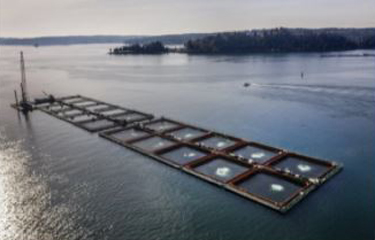Cooke gets two wins, advancing Salish Fish steelhead project in Washington

Cooke Aquaculture Pacific has won two victories allowing its plan to farm steelhead in the U.S. state of Washington to advance.
In a unanimous, 9-0 decision, the Washington Supreme Court upheld a decision by the Washington Department of Fish and Wildlife (WDFW) to allow Cooke to convert its idle Atlantic salmon net-pen farms to raise steelhead. The move was precipitated by Washington’s ban on farming of non-native species in its waters.
Cooke Vice President of Public Relations Joel Richardson said the decision “lays to rest the array of disinformation about marine aquaculture being irresponsibly circulated by activist groups.”
The decision allows Cooke Aquaculture Pacific to farm steelhead trout in Puget Sound and advances Salish Fish, Cooke’s joint-venture steelhead-farming project with the Jamestown S’Klallam Tribe.
“The court noted that the state agency spent a full year reviewing scientific reports and soliciting public input regarding Cooke’s desire to raise native, all-female sterile steelhead in net-pens in Puget Sound,” Jamestown S’Klallam Tribal Chairman W. Ron Allen said in an op-ed in The Seattle Times. “The agency wisely conditioned the permit on a series of risk-mitigation efforts, including the following stringent requirements: stocking of sterile all-female steelhead to reduce any reproductive risk to wild steelhead runs, a comprehensive round-the-clock monitoring and reporting program of conditions at the farms, and the use of modern mooring and cage systems engineered to withstand the harshest of weather conditions in ocean settings.”
In the fall of 2021, Cooke stocked its Hope Island and Clam Bay farms after it received WDFW permits.
Northwest Aquaculture Alliance President Jim Parsons, a former general manager of Cooke Aquaculture Pacific and current CEO of Jamestown Seafood, said the Supreme Court opinion is a boost to aquaculture not only in Washington, but elsewhere.
“As an industry, we are heartened to see a decision that essentially normalizes fish farming in Washington,” Parsons said.
Parson also responded to a 1 March biological opinion released by NOAA’s National Marine Fisheries Service finding marine finfish aquaculture in the Pacific Northwest caused little negative impact on native species such as endangered salmon, orcas, or their habitats.
The NOAA analysis, which was initiated in October 2018, was launched to analyze the effects of the U.S. Environmental Protection Agency’s approval of the Washington Department of Ecology’s Sediment Management Standards regarding marine finfish-farming facilities.
“After years of meticulous research and study, the scientists at NOAA have concluded, with full scientific certainty, that net-pen aquaculture in Puget Sound is safe for the environment and safe for the endangered species that live in these waters,” Parsons said.
The 215-page analysis said Cooke's steelhead-farming operations are "not likely to jeopardize the continued existence" of king salmon, steelhead, chum, yelloweye rockfish, or bocaccio "or adversely modify their designated critical habitat."
“This study, along with the recent unanimous Washington Supreme Court decision upholding Cooke Aquaculture Pacific’s permit to raise native steelhead in Puget Sound, finally puts to rest one of the biggest myths of all: that fish farming has a negative impact on endangered chinook salmon and orcas,” Parsons said. “As aquatic farmers, we depend on a healthy ecosystem to grow a range of aquatic food products – from steelhead trout to black cod to oysters, clams, mussels, and sea vegetables – instead of importing these foods. Sustainable aquaculture not only produces the nutritious, affordable food our world needs, but it also benefits working families in our rural communities."
Parsons said the push for more local food production during the unprecedented supply chain issues worldwide caused by the COVID-19 pandemic is an important reason for Washington to continue to allow commercial aquaculture to operate in state waters.
“Given the current world situation, it’s time for Washington to lead the way in delivering fresh, locally produced, seafood to consumers throughout the Pacific Northwest and the United States," Parsons said. "We encourage our leaders to rely on science rather than politics or claims made by certain anti-aquaculture activist groups in making key decisions about the future of aquatic farming and the blue economy in Washington.”
Photo courtesy of Cooke Aquaculture






Share